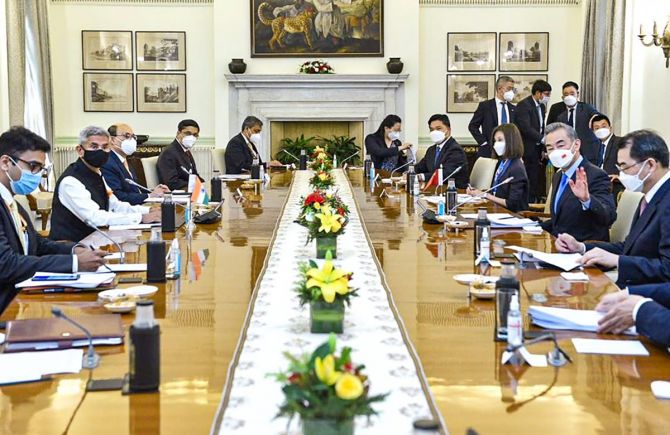NewsGate Press Network
By Vineet Dikshit
India on Friday the 25th of March 2022 categorically informed Mr Wang Yi, China’s foreign minister that immediate disengagement of troops in Ladakh is the requirement number one in order to improve relations between the two countries.
The foreign minister of China was in New Delhi for just around 24 hours on a not so public visit.
During his short stay in Delhi, Wang Yi met NSA Ajit Doval and EAM Dr. S Jaishankar who later briefed media himself sharing some details of his three hour long delegation level meeting with his China counterpart.
NSA’s meeting was short just around one hour.
The government said the focus was on the situation in the border areas and bilateral relations that had been “disturbed by Chinese actions since April 2020”.
Jaishankar was very candid in his press briefing stating the was “very honest” in his discussions with the Chinese FM “especially in conveying our national sentiments” on the border issue.
“The frictions and tension that arise from China’s deployments since April 2020 cannot be reconciled with the normal relationship between two neighbours.
“(Mr) Wang Yi spoke about China’s desire for a return to normalcy referring to the large significance of our ties. I was equally forthcoming that India wants a stable, predictable relationship, but restoration of normalcy will obviously require a restoration of peace and tranquillity.
“And if we are both committed to improving our ties then this commitment must find full expression in the ongoing disengagement talks,” he said.
He said they still have some ongoing friction areas on the border.
“We’ve also made a lot of progress in resolving some other friction areas and Pangong Tso is notable in that regard.”
Referring to Mr. Wang’s comments in Islamabad on Kashmir, earlier this week, Mr. Jaishankar said he explained why the comments made at the Organisation for Islamic Cooperation (OIC) were “objectionable”, adding, in a reference to Pakistan, that he hoped China would follow an “independent policy” towards India and not allow other relationships to influence that.
Mr. Jaishankar also raised the issue of Indian students who had to return from China two years ago due to the COVID-19 pandemic, and have not been allowed to re-enter the country and complete their studies.
When asked why Mr. Wang’s arrival in India had been cloaked in secrecy and only announced on Friday when the meetings began, Mr. Jaishankar said this was done at the request of the Chinese side.
“So, essentially, our discussion today was how to take this forward. The senior military commanders have been meeting. There have been 15 rounds so far.
“But the point is that so long as there are very large deployments in the border areas which are violative of the 1993 and 96 agreements, clearly the border areas situation is not normal.
So the main point I laid out was we have a situation where peace and tranquility have been disturbed, so the situation there is not normal.
“So peace and tranquility is the foundation of the basis of going forward, so then obviously that is disturbed.
“If you ask me, is our relationship normal today?
My answer to you is no, it is not. And it cannot be normal today if the situation in the border areas is abnormal, and surely the presence of a large number of troops in the border areas in contravention of agreements is an abnormality.”
On whether Wang had invited PM Modi for the BRICS summit later this year and how hopeful he was of the PM attending it in view of the border tension, the EAM said the two ministers had “discussed hosting the BRICS summit this year, which China naturally wants all leaders to attend”.


Comments are closed for this post.